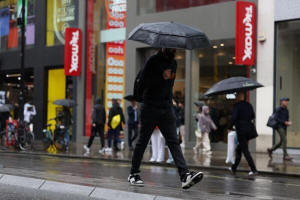UK inflation pressures stay hot, reducing chance of August rate cut
 Send a link to a friend
Send a link to a friend
 [July 17, 2024] By
William Schomberg and David Milliken [July 17, 2024] By
William Schomberg and David Milliken
LONDON (Reuters) - British inflation defied forecasts for a slight fall
and held at 2% in June while strong underlying price pressures prompted
investors to reduce bets that the Bank of England will cut interest
rates in two weeks' time for the first time since 2020.
Increases in hotel prices - in a month when U.S. pop star Taylor Swift
and other performers toured the UK - were partly to blame for the
higher-than-expected inflation number, underscoring the BoE's concern
about services prices.
Britain's once-towering headline inflation is lower than in the United
States and the euro area after past jumps in food and energy prices fell
out of the numbers.
But core inflation is higher and the BoE is unlikely to take much
comfort from the latest figures.
"If an August rate cut was 'touch and go' before this morning's data
then it's even more so now," Cathal Kennedy, senior UK economist at RBC
Capital Markets, said.
Economists polled by Reuters had mostly expected headline consumer price
inflation would ease to 1.9% in the 12 months to June, extending its
drop from a peak of 11.1% in October 2022.
Inflation for services was 5.7%, the Office for National Statistics
said, unchanged from May. The Reuters poll had pointed to a slightly
weaker 5.6% increase.
Investors pared back bets on a BoE rate cut on Aug. 1, the date of its
next scheduled monetary policy announcement, to about 35%, down from
just under 50% before the data.
The pound hit its highest for nearly two years against the euro and
around one year against the dollar, rising above $1.30.

The BoE took comfort from May's fall in consumer price inflation to its
2% target for the first time in nearly three years. But it has expressed
concern about the strength of services inflation, which largely reflects
pressure from wage growth in a labour market short of candidates to fill
jobs.
SWIFT HOTEL PRICE BUMP?
Deutsche Bank chief UK economist Sanjay Raja said the hotel prices
increase might reflect the Taylor Swift tour. Although this rise could
well reverse in July's data, overall Wednesday's inflation numbers would
not be encouraging for the BoE.
"We now think that an August rate cut is finely balanced. A lot will now
depend on the strength of the May wage and unemployment data," he said.
[to top of second column] |

Shopper holds an umbrella while crossing the road on Oxford Street
in London, Britain, July 9, 2024. REUTERS/Hollie Adams/files

Data due on Thursday is expected to show wages are still rising by
almost 6% a year - roughly double the rate that would be compatible
with keeping inflation at 2%.
An interest rate cut on Aug. 1 would give an early boost to new
Prime Minister Keir Starmer and his finance minister Rachel Reeves
after a landslide election victory two weeks ago.
The new government's legislative agenda - including its plans to
boost economic growth - is due to be announced in parliament later
on Wednesday.
But last week the BoE's Chief Economist Huw Pill said the timing of
the first rate cut remained an open question. On Tuesday, the
International Monetary Fund's chief economist, Pierre-Olivier
Gourinchas, said services inflation in Britain, like in the United
States, was likely to prove sticky.
Core inflation - excluding volatile food and energy prices - held at
3.5% in the 12 months to June, the ONS said, matching the median
forecast in the Reuters poll.
The BoE had expected headline inflation of 2.0% in June and services
inflation of 5.1%, according to forecasts it published two months
ago. The BoE also expected headline inflation to rise back above its
target later this year and through 2025.
The ONS said upward pressures on headline inflation in June included
a smaller fall in the costs of second-hand cars than in June last
year, as well as the increase in hotel prices.
Some analysts pointed to a fall in service price inflation in June
if volatile items such as hotel prices are excluded.
The ONS used 56 price quotes to measure hotel inflation in June with
two of them raising prices by 176% and 145% from May. One of those
two was located in northwest England shortly before Swift performed
in Liverpool, accountant and data analyst Peter Donaghy said on X.
Clothing prices fell as retailers resorted to discounting to entice
shoppers still feeling the impact of a cost-of-living squeeze and
wetter-than-usual summer weather.
(Writing by William Schomberg; additional reporting by Andy Bruce;
editing by Christina Fincher and Hugh Lawson)
[© 2024 Thomson Reuters. All rights
reserved.]
This material may not be published,
broadcast, rewritten or redistributed.
Thompson Reuters is solely responsible for this content. |